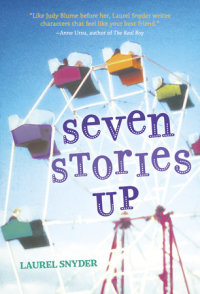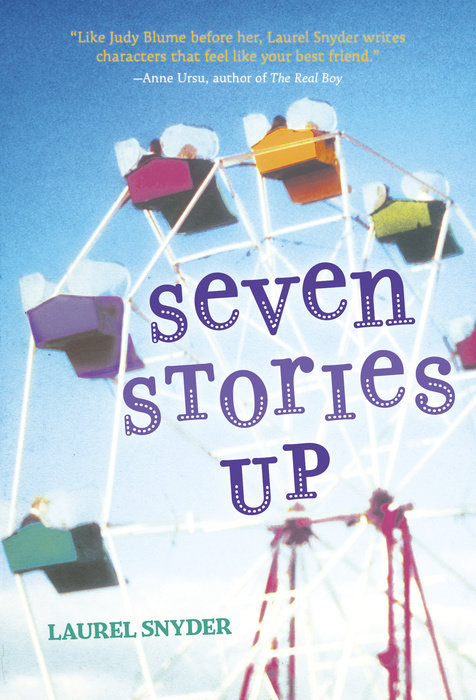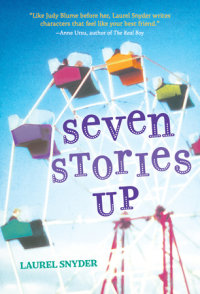1
You're Supposed to Cry
You're supposed to cry when your grandma is dying. You're supposed to be really sad. But as Mom and I sped through the dark streets of Baltimore, I couldn't stop bouncing in my seat. At last I stuck my head out the window and leaned into the muggy night. My hair whipped around. The sharp rush of air felt good on my face.
I'd always wondered about my grandmother. That might sound funny, but Mom didn't talk about her family at all. If I asked a question, even for a school project, she'd find a way to change the topic. She'd suddenly decide that she had to pay the bills "pronto," or she'd remember that Dallas was on TV "right this very minute."
If I kept pushing, she'd make her sad face and say something like, "Kiddo, let's leave that story in the past, where it can't cause trouble." I never understood what exactly the trouble might be, but I didn't like to see Mom unhappy, so I'd learned to invent my own stories.
1
You're Supposed to Cry
You're supposed to cry when your grandma is dying. You're supposed to be really sad. But as Mom and I sped through the dark streets of Baltimore, I couldn't stop bouncing in my seat. At last I stuck my head out the window and leaned into the muggy night. My hair whipped around. The sharp rush of air felt good on my face.
I'd always wondered about my grandmother. That might sound funny, but Mom didn't talk about her family at all. If I asked a question, even for a school project, she'd find a way to change the topic. She'd suddenly decide that she had to pay the bills "pronto," or she'd remember that Dallas was on TV "right this very minute."
If I kept pushing, she'd make her sad face and say something like, "Kiddo, let's leave that story in the past, where it can't cause trouble." I never understood what exactly the trouble might be, but I didn't like to see Mom unhappy, so I'd learned to invent my own stories. Like in the first grade, when I told Mrs. Johnson that my mom was an orphan princess from Idaho. She'd made me build a diorama about it, in a shoe box. That was how I learned that Idaho is a mountainous region bordering Canada, full of colorful gems and potatoes.
Idaho aside, here's what I knew:
1. My mom grew up in Baltimore but left for college in Atlanta.
2. Her dad had been dead a long time, but her mother was still alive.
3. She had aunts somewhere, who sent big glittery Christmas cards each year.
I also knew that my dad had skipped out on us in 1975, right after I was born, but that was different. Mom didn't mind talking about him. She said she couldn't be too mad, even though he was kind of a louse, because without him she wouldn't have me, and I was her very best thing in the world.
We did have one lonely Polaroid of my grandmother in our scrapbook. I was a chubby baby in the picture, and my grandmother, in gray curls and an ugly plaid pantsuit, held me out stiffly to the camera with both hands. She looked afraid she might drop me.
I'd stared at that photo for hours, memorizing her clothes and posture, the paisley wallpaper in the background. I knew her name was Mary. That was all I'd ever expected to know.
Until now! Now I was in a strange city at midnight, racing toward her deathbed. Her deathbed? It was like a scene from a movie. If only I could stop imagining her gasping her last breath in a pantsuit.
I pulled my head in the window again and tried to comb my wind-snarled hair with my fingers. Mom had turned the radio on and Michael Jackson was singing softly. I watched the city rush by, row houses lining each street. Everything narrow and brick. As we went over a bridge, I saw boats rocking gently in a harbor. I sneezed at a strong scent of--was it cinnamon? Weird.
Without realizing it, I'd started to chew my thumbnail. I could feel the ragged needle of a hangnail with my tongue. I yanked it off with my front teeth, winced, and jammed my hand in the pocket of my jean shorts.
At last Mom turned onto a shadowy tree-lined street and slowed the car to a crawl, inching past enormous town houses with tall doors and tiny squares of garden. After a few blocks, we pulled into a driveway. I unsnapped my seat belt and scrambled out into a wide drive of gray bricks. Staring up at a tall stone building, I forgot to breathe.
It was past midnight, but the moon was full and there were street lamps, so I could make out the grinning gargoyles over the double glass doors. HOTEL CALVERT, read the brass sign that peeked out through a tangle of ivy. I was surprised. Usually we stayed at a Holiday Inn or a HoJo. Someplace cheap, with scratchy sheets and a half-empty candy machine in the lobby.
Mom was rooting in the trunk for our suitcase. I listened to her thump and cuss; then I looked back up at the hotel. That was when I noticed the dark windows. There was just one square of brightness along the side of the building, all the way up on the top floor. One window that blazed. Everything else was dark.
"Hey, Mom," I said slowly. "I don't think this place looks open."
"It isn't," Mom said, slamming the trunk. "I have a key."
"You have a key?"
Mom started up the overgrown drive with our bag, her clogs clacking in the darkness. I shut my door and hurried after her, stumbling over a loose brick. "Wait," I called. "You said we were going straight to my grandma's house."
"This is it," said Mom, stopping and gesturing tiredly at the hotel.
"This?"
"It's hers."
"The whole thing?"
Mom nodded. "The whole thing. Though I guess it's about to be mine. Or--ours. I grew up here."
"Here?" I stared up at the leering gargoyles. "You grew up here?"
She shrugged. "I tried to, anyway."
"Are you kidding me?" I shouted. "This place is amazing, like out of a novel or Europe or something!"
Mom sighed as she rooted in her big straw purse. "A novel . . . You don't know the half of it."
"No," I said. "I don't. But this is an even better story than Idaho!"
"Maybe a good story," she said grimly. Then she added in a softer tone, "Look, Annie, I know I owe you a lot of explanations. Just--not tonight. Okay?"
"Okay," I said. "But wow. You grew up like Eloise."
"Not quite like Eloise," said Mom. "I never had a pet turtle." She groaned as she hefted the suitcase up the three moss-covered steps that led to the double doors, but the bag tipped over as rain began to spit down. I caught the bag as it fell. It almost sent me tumbling.
"Rain?" Mom looked up at the sky like she was asking it a question. "Perfect." She grabbed the handle of the suitcase back from me. Then she stuck a key in the lock, opened one of the massive doors, and hurried inside. She called over her shoulder, "Let's get this over with. Then maybe we can watch a movie, if Mother ever figured out how to hook up the VCR I sent."
A movie was the furthest thing from my mind. I stood in the rain and felt the drops hit my face. I stared up at the ledges of the old windows, at curling vines that gripped the stone, at the building above me, which looked like something from a dream.
Then I stepped into the lobby, and it was beyond anything I could have invented or wished for. I let the door fall shut and stared up, up into the tallest room ever. A chandelier hung from the ceiling, an icy shower of diamonds in the darkness. It wasn't on, but it shimmered like magic in the dim light. I felt a tremble, like I was shimmering too.
Mom had already crossed the black-and-white checkerboard floor. Now she turned back to me, at the foot of a marble staircase. "I can't imagine how it must seem to you." She gestured at a grand piano in the corner. "All this glitz. Kinda crazy, huh?"
"Kinda," I said. "But good crazy. Totally awesome crazy."
Mom frowned slightly. "I wish I could see it like you're seeing it. For the first time. I guess it is totally awesome." Then she added, "Come on," and turned back around to flip a switch that shed warm light down a hallway. "Time's up, kiddo. Let's get gone."
As I followed her across the cavernous room, I sneezed. Dust and cobwebs hung on to every surface: the antique end tables and lamps, the reception desk with its tarnished brass top.
I reached out to touch a statue, a white angel that tiptoed above a pedestal at the foot of the staircase. Beneath the dust, the marble gleamed a bright white. I stared into the angel's face. How many years had she been waiting like that, dusty in the darkness? Alone.
Mom was tapping her foot. "Annie, seriously, come on!"
I sprinted over to where she stood in front of an old elevator. The doors were heavy and gilded, engraved with a pattern of vines and flowers. I reached out a hand to feel the grooves in the metal as they slid open.
Inside, Mom pushed the 7 button, the highest number on the panel, and though the button didn't light up, the doors slid together and the elevator began to move. A bell rang when we arrived with a clattering metallic brrrrring!
We stepped out into an unlit hallway with wall-to-wall carpet that made it hard to pull the suitcase. I reached up to put a hand on Mom's arm so that I wouldn't trip and fall, as together we fumbled along in the whispery darkness. Farther down we made a right turn, then almost immediately Mom had her keys jangling at another door.
"Great," she grumbled, "now the key is sticking. C'mon. Work!" She kicked at the door.
"Here," I said, "let me try. . . ."
I leaned toward Mom, pushed her hand aside, and turned the key. When I gripped the glass knob, it felt good, smooth and cool in my hand. The door unlocked right away with an even click. I pushed and it swung inward.
"Thanks," said Mom.
We stepped together into a living room that was small and impossibly neat. It was air-conditioned, and the change in temperature took my breath away. I looked around. There was a beige-and-white-striped sofa with a matching recliner. Dried flowers stood in a white vase on a glass coffee table. There were no smudges on the glass. The carpet was creamy and the walls were tan. The room felt bland and unused, like a display in a department store.
Across from us a woman slept upright in a chair with a paperback on her lap. She was wearing green hospital scrubs and purple eye shadow. Beside her chair was a closed door.
"Hello?" Mom called softly.
The lady started and opened her eyes. Without missing a beat, she put a finger to her lips, set her book on the floor, and stood up.
Mom walked across the room and whispered something in the woman's ear. Then they both turned to look at me. The lady shook her tightly permed hair and frowned. I squinted to read her name tag: EMERY ROTH, RN.
"Annie," whispered my mom gently. "You go on ahead in there." She pointed to an open door on the other side of the couch. "Take our stuff and get yourself settled. There's a bathroom, and you can watch TV. Just try not to make too much noise."
"Where are you going?" I asked.
She nodded at the closed door beside her. "In here for a sec."
"But I want to go with you," I said.
"No, ma'am. What's in that room is not . . . fun."
"I know," I said. "I don't care."
"You don't care because you don't get it," Mom said. "This is serious, Annie. It isn't some adventure from a book. My mother is sick, and I need to see her. In case she . . ." She didn't finish her sentence.
"Dies?" I asked.
Mom flinched.
"This might be my only chance," I argued. "I'm old enough to handle it, I promise. I'll be in middle school this fall."
Mom crossed her arms and stared down at me. "Even so, kiddo, you need to trust me on this one."
"I'm not scared."
"You're never scared," said Mom. She leaned down and touched my face. "But this isn't about you, Annie. Please? Help me out here?"
I could have argued with her, but Mom looked so tense I actually did feel a little scared. "O-okay," I said.
Mom straightened up, turned her back on me, twisted the knob, and slipped through the door. Emery Roth, RN, sat back down and picked up her book as if I wasn't there, so I dragged our suitcase away, carving a groove in the plush carpet.
There wasn't much to look at in the other room. Just furniture, a small television, and an open door that led to a bathroom. I looked out the one window and saw that it was raining harder. In the distance, lightning flashed above the clouds, but I didn't hear thunder. I guessed it was still too far away.
Along one wall there was a display of framed photos. The pictures were mostly black-and-white, but a few were in color. I leaned in for a better look.
The color photos were of a young couple and their curly-haired baby. Was that Mom? I guessed so. The dad wore a hat and had a thin mustache. The mom was delicate and pretty, with dark curls and red lips. I could see how she might grow into a gray-haired grandma in a pantsuit. The man and woman weren't touching. Not one arm around a shoulder. No smiles.
The older photos, the black-and-white ones, were of a larger family, all dressed up in old-timey clothes, derby hats and frilly dresses. Most of those shots were of special occasions, Christmases and weddings, taken in the lobby downstairs. Were these the glittery Christmas card aunts? Maggie? Ginny?
On a low shelf in the cabinet beneath the bedside table, I came across a scrapbook, with fancy gold lettering that read MY SCHOOL DAYS. I flipped it open, and the delicate paper tore away from the binding. Property of Mary Moran, the torn page read in cramped, careful handwriting. I began to turn the pages gently, but the book was almost empty. There were a few birthday cards, and clippings from newspapers: about Amelia Earhart, John F. Kennedy, Princess Elizabeth. I found a curl of dark hair tied with a tiny ribbon, and a couple of dead earwigs. That was it. No love letters. No secrets.
I put the scrapbook back and heaved our suitcase onto the flowered bedspread so I could pull out my nightgown and kit bag. Then I walked into the bathroom to arrange my stuff: toothbrush, inhaler, vitamins, hairbrush, and my prized strawberry Lip Smacker, the only makeup Mom allowed.
That was when I heard voices. Sharp but quiet sounds, murmurs coming from the towel rack mounted on the back of a white door. I knew I shouldn't do it, but I couldn't stop myself. I reached behind the soft folds of terry cloth and felt for a knob. When I turned it, I crossed my fingers. The door opened a crack, and a sharp smell wafted in at me, a mixture of carnations and poison. A hospital smell.


